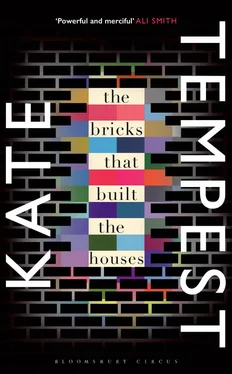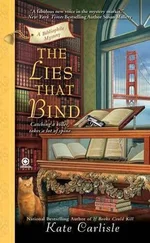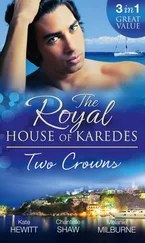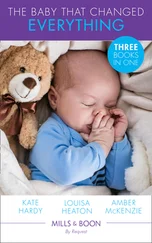‘Whatever it is you’re scared of them being, it’s not like that, Pete. It’s just one person touching another person’s body.’ The wind is drumming harder. ‘Do you see, Pete? This is no threat to us. It’s just my job. And I’m not going to stop doing the one thing I’ve ever wanted to do because you feel jealous.’
‘It’s not the dancing I’ve got a problem with.’ He feels exasperated. He doesn’t have a leg to stand on.
‘The two things go hand in hand,’ she says. ‘I’m not stopping. This is how I make my living.’ And she looks into his face for his eyes but she can’t find them. He keeps looking down at his lap. ‘I’m on my own,’ she says. ‘Have been since I was fifteen. No savings, can’t run to my parents, can I? Can’t ask my auntie for money, they’ve got none. It’s hard enough for them trying to keep that café going. It’s just me, Pete, just what I can make happen.’ She doesn’t say not like you but he can hear her thinking it.
He gives her back her tea.
He sits in the pub with his friends, a ghost in a hoodie. Nothing to say; he kills time. And his friends are growing bored of his dejection. He gets home and waits for her to finish her shift. It’s three in the morning, He’s reading. Sketching in his notebook. He’s all right. He’s not thinking of the hotel rooms, the men’s faces, the men’s bodies, their cocks in her hands. Does she smile for them when they come the way she smiles for him? He’s not thinking of that. Her knocking on the hotel-room door. He’s not thinking of it. Her voice in his head. It’s nothing to be jealous of . And he knows it’s no threat . But it’s not like he can say, ‘Don’t work tonight, I’ll cover the rent this month, you just focus on your dancing.’ He’s got no fucking money. It’s no threat . He’s crumpling. He gives himself a good talking-to.
An hour later she rings him to say she’s outside. He opens the door and he knows where she’s been and it’s so good to see her face there in the street light, those eyes that he loves, that smile rising over those lips that are his favourite lips, but he knows where she’s been and it hurts, he can’t help it. ‘Give me your mouth,’ she says, and he does but he doesn’t.
Love to faults is always blind,
Always is to joy inclined,
Lawless, wingèd, unconfined,
And breaks all chains from every mind.
The souls of men are bought and sold
In milk-fed infancy for gold,
And youth to slaughter-houses led;
And beauty, for a bit of bread.
William Blake, ‘Freedom and Captivity’
Harry is holding a brick of money. She’s about to count it for the fourth time. Her socks are too big for her, baggy round her ankles. She hates that, but she hasn’t had time to put a wash on and she uses all her best socks first. She is wearing bright red lipstick. Sometimes when she counts her money, she likes to put on lipstick and slick her hair back like a matador.
Leon is walking down the stairs and into the living room. His footsteps are soft but Harry hears him the way you hear your own legs moving. Places him in the house by feeling. Leon stands in the doorway of the kitchen.
‘Alright?’ Harry asks him, not taking her eyes off the money.
‘All good,’ he replies, sloping to the fridge, opening it and bending down to peer in. ‘Want a beer?’ he asks.
‘Go on then,’ she says, counting.
Leon pulls one out of the fridge, opens it, passes it over, gets one for himself and sits heavily down at the table, opposite Harry. ‘How much we got?’ he asks, not looking up from his bottle.
‘Six hundred and seventy bags.’ Harry blows out air through pursed lips. ‘Between this and what’s put away. Give it seven or eight months we’ll be there, maybe sooner.’
Leon taps his heels on the lino. ‘Fuck!’ he says, and he makes the word last a long time.
Leon had grown up in the block of flats by the shops at the top of Harry’s road. As kids, the two had been inseparable. They played fighting games and football and hatched plans to make their millions; they were going to buy a submarine that they would live on, pulled by a fleet of sharks who would come to them like dogs when they whistled.
Leon was a quiet kid with a beautiful complexion. English mother, indigenous Venezuelan father, and a constant power surging beneath his skin. As a ten-year-old, he would spend his evenings reading up on revolutions and civil wars. He hid under the covers with library books, reading by torchlight, some nights till breakfast time. History fascinated him, maybe because he knew nothing of his own.
He never met his dad, never saw a photograph, never heard his name. Didn’t know one scrap of a story about him, but the older he grew, the more he resembled him, and the more his mother seemed to shrink away.
They had met in another age, his parents. Leon’s father, Alfredo, had journeyed to England at eighteen, brought over by the renowned British journalist and eco-activist James Peake, who had been living with Alfredo’s people, the Wotuja, for three years, learning their ways and recording their struggle, in the Orinoco region of the Amazon rainforest.
James was a well-meaning but painfully unaware Englishman with a large amount of inherited wealth at his disposal and a hero complex. His anthropological interest was genuine, but his reverence of the indigenous people bordered on perverse. At his core, he desperately wanted to help, but he had a tendency to patronise and romanticise the tribe. He found in Alfredo an opportunity to really ‘make a difference’ and he seized it with all his strength.
Alfredo’s spirits hardened after years of bearing witness to the destruction of everything he knew to be holy. These were the last days that the priests and the poets all sang of. He’d felt the forest shrink and scream. He’d heard the stories from his uncles of the day the men from the big American company had come with their contracts, how they had smiled at the elders as they exchanged bags of sugar and white rice and big kegs of gasoline for a mark on a piece of paper. And then, weeks later, he’d heard how they’d come back with their trucks and their machines and opened the mines. He’d seen his tribe grow sick from illnesses the shamans couldn’t cure with the leaves that had always cured his people. He’d seen the miners tear the earth apart, dig the roots up from the trees and kill the gods inside them that protected the forest. He’d seen them rip the skies apart and set the clouds on fire. He’d seen the cancers come from the huge black clouds of smoke that streamed out of the mine all day and all night and he’d seen the children born with red blotches on their faces, blotches that wept and bled and meant the child would die.
Alfredo was a young man, and as with young people all over the world, he saw injustice and it hurt him and he couldn’t ignore it. His rage was wild and shook in his chest like an animal. He was not yet old enough to tell himself that there was nothing he could do.
In an effort to protect his home and his people from total destruction, Alfredo, with James Peake’s instruction, had learned English. He had a talent for it and read until James had no books left to bring him. Under James’s diligent tutelage, he’d applied for a place at Oxford University. He was going to fight this fight in the only way that he could see working: on his enemy’s terms.
He was going to speak the language, learn the laws and understand the hateful logic of his oppressor. Then, he thought, he would be better equipped to explain to them that they were murdering his people and that they couldn’t last much longer. He was convinced that once they knew what was happening, once they could understand the cost of the destruction, there could be no way that whoever was responsible for what was happening to his people could choose money over human life. Not if he made them see that the choice was really that simple and that absolute.
Читать дальше












